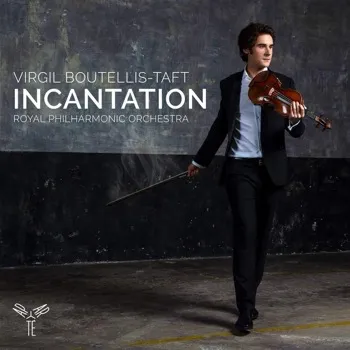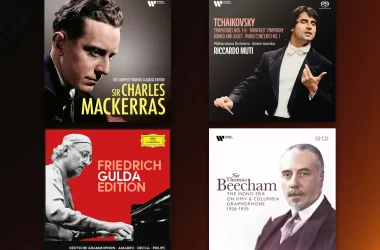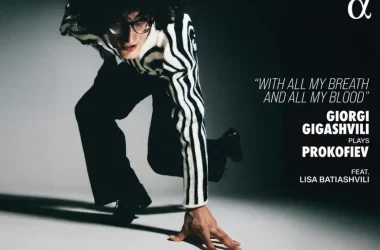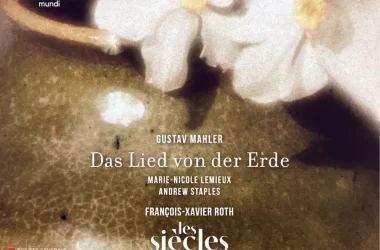For his second album, violinist Virgil Boutellis-Taft joins with the Royal Philharmonic Orchestra of London and conductor Jac van Steen to produce a recital album full of haunting, slow melodies. The album, titled “Incantation”, aims to enchant and mesmerize, to make you sigh or yearn. The program includes violin standards like Tchaikovsky’s Sérénade mélancolique and Chausson’s Poème, as well as arrangements of other famous, minor-key melodies like Bruch’s Kol Nidrei or Saint-Saëns’ “Danse Macabre”.

Doubts sneak in from the first track, a new arrangement of Bruch’s “Kol Nidrei” by Paul Bateman. Boutellis-Taft and the Philharmonic struggle to establish the plangent mood that makes Kol Nidrei such a cherished work. The tempo fluctuation at the very beginning is odd, and then when Boutellis-Taft enters, the tempo is further destabilized by his rubato and the orchestra’s overly soft articulation. It leaves the main theme spineless. Bateman’s arrangement of the piece also has some issues. For instance, in Bruch’s version for cello, the theme is played first in the tenor range, and then drops to the baritone, whereas in Bateman’s, it goes tenor to soprano. This ruins the emotional effect of the repetition —the second statement should gently reflect the first, not sharply intensify it. As the piece progresses, and Boutellis-Taft chooses to skip Bruch’s contrasting sections in order to remain closer to the “incantation” part of the piece, nothing emerges from the repetitions. All these issues are a shame, because Boutellis-Taft plays with a rather beautiful, front-loaded, and siren-like tone, and the orchestra possesses a large and nuanced color palette.
These positive qualities do shine through in the “Danse Macabre” arrangement. The uptick in tempo and strong pulse provide a refreshing contrast to the rest of the album. Bateman’s arrangement works nicely, for instance moving the opening melody from the flute to the solo violin’s g-string. Boutellis-Taft manages tricky double-stops with ease, and his precise, biting playing throughout hints at the presence of a fiery and skilled interpreter. The Philharmonic provides good accompaniment, at times waxing sentimental and at others driving forward. Chuasson’s “Poème” is another highlight, the orchestra and soloist uniting for exciting crescendos and moving tuttis, for example 11’20” to 14’20”. Boutellis-Taft plays with strength throughout, though he could take more risks in cadenza-like moments, like 3’55” to 5”35”, to increase excitement.
Tchaikovsky’s “Sérénade mélancolique” and Bloch’s “Nigun”, such ravishing works, are sadly disappointments here. in the Serenade, Boutellis-Taft’s opening statement leaves me cold; at the delicate recapitulation, I eagerly waited for some drama; and in the coda, his trills feel perfunctory. Listen to Pinchas Zukermann play with Zubin Mehta (Sony, 1985). The tempo is faster, but the emotional weight is palpable from the outset; the recapitulation is perfectly drawn out; and the trills are breathtaking — the modulation is played like a complete revelation. In Nigun, the second movement of Bloch’s violin concerto “Baal Shem”, as in the Kol Nidre, Boutellis-Taft’s use of rubato interferes with any emotional momentum he builds up.
Overall, It’s clear that Boutellis-Taft is a passionate player; you can practically feel it through the audio. His technical skill is great; he has good control of the slight nuances of intonation and his glissandi and vibrato are varied and sumptuous. What may be lacking is some communicative skills. I questioned some of his phrasings – some notes pop out where they shouldn’t, some fade too soon, and legatos are interrupted unexpectedly. These make it difficult to shape emotional arcs over entire pieces of music.
The sound quality on this album is commendable. It captures Boutellis-Taft’s playing in bas-relief; there is a great depth of sound, and the orchestra is well-balanced behind him. In sum, though, The idea of “Incantation” is lost amidst phrasing and rhythmic issues, and the album ultimately misses the mark in terms of musical and emotional impact.
“Incantation“
Max Bruch – Kol Nidrei
Vitali – Chaconne
Saint-Saëns – Danse macabre
Tchaikovsky – Sérénade mélancolique
Bloch – Nigun (from Baal Shem)
Chausson – Poème pour violon et orchestre
Umebayashi – Yumeji’s Theme
Virgil Boutellis-Taft – Violin
Royal Philharmonic Orchestra
Jac van Steen – Conductor
Aparté, CD AP234




















